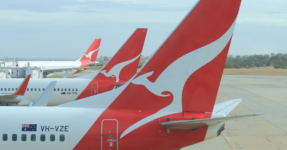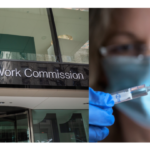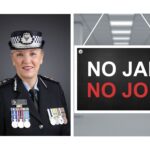The Workplace Offence of Engaging in Discriminatory Conduct for a Prohibited Reason in NSW

Australia’s most famous airline is in Downing Centre District Court this week, facing criminal charges after it allegedly dismissed a worker for raising concerns about contracting Covid-19 from aircraft arriving from China at the start of the pandemic.
Qantas has been accused of violating the Work Health and Safety (WHS) Act by failing to provide proper cleaning equipment to employees.
Cleaner says he was sacked for ‘raising safety concerns’
At the centre of the case is the conduct of Theo Seremetidis, who worked for Qantas as an airline cleaner for seven years before his position was terminated.
Mr Seremetidis asserts that the reason for his dismissal was that he informed fellow employees it was within their rights to stop any work deemed “unsafe”.
He gave this advice after Qantas failed to provide personal protective equipment (PPE) and disinfectant to its employees and contractors, directing them to clean aircraft cabins with water alone.
Mr Seremetidis was the employee Health and Safety representative and asserts that the position placed a duty of care on him to direct his colleagues to cease working on the aircraft that had arrived from China, after his requests for protective and proper cleaning equipment were ignored by the company.
Timeline of the Covid-19 pandemic
Mr Seremetidis gave his cease work directive in late January / early February of 2020, and his dismissal followed shortly thereafter on 7 February of that year.
At the time, little was known about Covid-19, except that it was highly contagious and making people very sick – some people were dying from the virus.
By 23 January 2020, it became clear that humans could contract the virus – not just animals as some had stated. Wuhan was placed into lockdown and quarantined from the rest of China at this time.
The World Health Organisation began regularly publishing information and it finally declared a public health emergency on 31 January.
Australia blocked arrivals from China in February 202 and the Federal Government closed borders on 19 March, with many other nations following suit.
Unfortunately, the incident with Mr. Seremetidis isn’t an isolated one. In fact, it is just one of many instances in which Qantas is accused of failing to provide its workers with proper equipment that they need to do their job.
Qantas faces millions of dollars in fines
Several charges of engaging in discriminatory conduct in the workplace for a prohibited reason have been brought against the company, each of which carry a maximum fine of 5,770 penalty units for a company – which is currently the equivalent of $634,700.
This means the company’s fines could be in the millions if the charges are proven.
If compensation is awarded to Mr Seremetidis, Qantas would be expected to pay whatever the court determines as an appropriate amount, and that would be paid separately.
Qantas pleads not guilty
In its defence, Qantas is arguing that not a single positive Covid-19 case was carried on its flights back from China, that employees were provided with safety equipment such as masks, gloves and gowns as well as a disinfectant cleaning product, and that its medical team gave briefings on Covid risk controls.
It contends on that basis that it was not unsafe to work on the aircraft coming from China.
The airline has stated publicly that Mr Seremetidis was directed not to come to work while he was investigated for failing to comply with the company’s “Standards of Conduct” policy, including attempting to incite unprotected industrial action.
It further claims Mr Seremetidis was made redundant as part of a decision to outsource ground handling, not for his direction to colleagues.
Union welcomes criminal prosecution
Transport Workers’ Union National Secretary Michael Kaine has welcomed the prosecution, stating:
“No other company in Australia has ever faced these serious criminal charges. If the District Court agrees that Qantas was in criminal breach of the WHS Act by targeting a trained health and safety rep, it will achieve Qantas yet another accolade for attacking workers – alongside the crown for the largest case of illegal sackings in the country as determined twice by the Federal Court.
“The standing down of Theo coincided with Qantas’ efforts to downplay the deadly virus in public commentary and worker briefings. Shortly after, a covid cluster occurred in the Qantas baggage room in Adelaide, which almost claimed the life of one of our members.
“Over the last two years, we’ve seen that Alan Joyce and other overpaid executives receive multimillion dollar bonuses for finding new and perverse ways to tear down workers and trash standards at our once-cherished national carrier. We need a Safe and Secure Skies Commission to take the excessive greed out of aviation and restore it to a fair, safe and reliable industry.”
A previous breach of the Fair Work Act
This is certainly not the first allegation levelled against Qantas when it comes to unfairly dealing with its workers.
The Transport Workers’ Union took the company to the Federal Court of Australia after it outsourced of 2,000 ground crew, leading to mass dismissals.
The court found last year that Qantas breached the Fair Work Act by engaging in such conduct, with Justice Michael Lee saying he was not convinced the decision to outsource the jobs was unmotivated, at least in part, by the fact the majority of the workers were union members and had various workplace rights under enterprise agreements.
The employees included baggage handlers, ramp workers and cabin cleaners across airports in Sydney, Melbourne, Brisbane, Perth, Adelaide, Darwin, Cairns, Townsville, Alice Springs and Canberra.
Qantas had tried to argue the decision was made to save the company $100 million a year – money it “desperately needed” in the face of the Covid-19 impact, despite the fact that Qantas received Federal Government support of around $2 billion, including A$850 million in wage subsidies for those who lost their jobs.
Qantas also caused considerable controversy as one of the first Australian-based businesses to mandate Covid vaccinations for both employees and passengers. The requirement for passengers to be fully vaccinated and carrying the documentation to prove it, was only lifted a few months ago.
The workplace offence of engaging in discriminatory conduct for a prohibited reason in NSW
Engaging in discriminatory conduct in the workplace for a prohibited reason is a criminal offence under section 104(1) of the Work Health and Safety Act 2011 (NSW) which carries a maximum penalty of 1,155 penalty units (or $127,050) for an individual or 5,770 penalty units (or $634,700) for a corporation.
Section 105 of the Act stipulates that a person engages in discriminatory conduct if he or she:
- dismisses a worker,
- terminates a contract for services with a worker,
- puts a worker to his or her detriment in the engagement of the worker,
- alters the position of a worker to the worker’s detriment,
- refuses or fails to offer to engage a prospective worker,
- treats a prospective worker less favourably than another prospective worker would be treated in offering terms of engagement,
- the person terminates a commercial arrangement with another person, or
- the person refuses or fails to enter into a commercial arrangement with another person.
Threatening or organising to do any of these things is included in the definition.
Section 106 of the Act provided a person engages in conduct for a prohibited reason if it is engaged in because the worker or prospective worker:
- is, has been or proposes to be a health and safety representative or a member of a health and safety committee,
- undertakes, has undertaken or proposes to undertake another role under the Act,
- exercises a power or performs a function or has exercised a power or performed a function or proposes to exercise a power or perform a function as a health and safety representative or as a member of a health and safety committee,
- exercises, has exercised or proposes to exercise a power under this Act or exercises, has exercised or proposes to exercise a power under the Act in a particular way,
- performs, has performed or proposes to perform a function under the Act or performs, has performed or proposes to perform a function under the Act in a particular way,
- refrains from, has refrained from or proposes to refrain from exercising a power or performing a function under the Act or refrains from, has refrained from or proposes to refrain from exercising a power or performing a function under the Act in a particular way,
- assists or has assisted or proposes to assist, or gives or has given or proposes to give any information to any person exercising a power or performing a function under the Act,
- is taking action, has taken action or proposes to take action to seek compliance by any person with any duty or obligation under the Act, or
- raises or has raised or proposes to raise an issue or concern about work health and safety with:
- the person conducting a business or undertaking,
- an inspector,
- a WHS entry permit holder,
- a health and safety representative,
- a member of a health and safety committee,
- another worker,
- any other person who has a duty under this Act in relation to the matter,
- any other person exercising a power or performing a function under this Act,
- is involved in, has been involved in or proposes to be involved in resolving a work health and safety issue under the Act, or
- is taking action, has taken action or proposes to take action to seek compliance by any person with any duty or obligation under the Act.
Section 110 of the Act makes clear that in criminal proceedings brought under section 104, if the prosecution proves each of the elements (ingredients) of the offence, then it is presumed the reason alleged for the discriminatory conduct is presumed to be the dominant reason for that conduct unless the defendant proves otherwise on the balance of probabilities.








